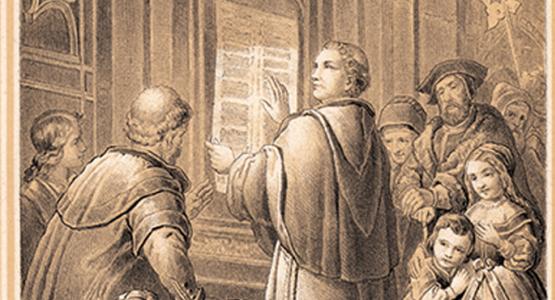
Editorial: A Matter of Conscience
Editorial by Dave Weigley
This year marks 500 years since Martin Luther posted his 95 Theses on the Castle Church door in Wittenberg, Germany (Oct. 31, 1517), challenging the established religious beliefs and practices of his denomination, and launching the Protestant Reformation. Conscientiously, he could not reconcile church practices with biblical teachings as he understood them.
Four years later, when summoned by church authorities to recant his teachings, he uttered: “I cannot and I will not retract, for it is unsafe for a Christian to speak against his conscience. Here I stand, I can do no other; may God help me? Amen” (Merle d’Aubigne, History of the Reformation in the 16th Century, b. 7, ch. 8, cited in The Great Controversy, p. 160.2).
Conscience has always been important to the followers of Jesus Christ. In the New Testament, as the disciples were beginning to proclaim the good news about Jesus and salvation through Him—like Luther, they were accosted by the established authorities of their day. After ignoring a directive not to openly preach about Christ, they were arrested and asked why they violated the council’s command. Their response: “We ought to obey God rather than men” (Acts 5:29, NKJV).
From our very beginning, Seventh-day Adventists have championed allegiance to the Bible and freedom of conscience. One of the founders of our movement, Ellen G. White, recognized our role in the Reformation, stating: “The Reformation did not, as many suppose, end with Luther. It is to be continued to the close of this world’s history. Luther had a great work to do in reflecting to others the light which God had permitted to shine upon him; yet he did not receive all the light which was to be given to the world. From that time to this, new light has been continually shining upon the Scriptures, and new truths have been constantly unfolding” (GC, pp. 148-149).
There will be times when, to follow such insights, it will require courage from believers to stand for matters of conscience. In his study of mission and governance, George Knight, history professor emeritus of Andrews University (Mich.), shares how early Adventists related to this value. Delegates to the 1877 General Conference Session voted that corporate decisions made by church governing bodies “should be submitted to by all without exception, unless they can be shown to conflict with the Word of God and the rights of individual conscience” (Review and Herald, Oct. 4, 1877, p. 106, cited in Presentation Papers on Mission and Governance, p. 42, italics supplied; available at columbiaunion.org/2016leadershipsummit).
As we begin 2017, may we conjure the courage to follow conscience and conviction for the cause of Christ and the advancement of  His mission in these last days of Earth’s history.
His mission in these last days of Earth’s history.
Dave Weigley is president of the Columbia Union Conference.

Add new comment